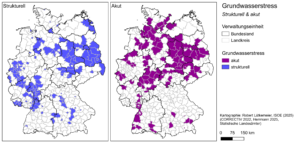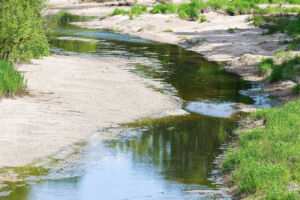Although Germany is considered a water-rich country, climatic, demographic, and economic developments are repeatedly causing water shortages in some regions. A recent overview study by the Institute for Social-Ecological Research (ISOE) on behalf of the German Environmental and Nature Conservation Association (BUND) now shows where groundwater stress exists nationwide: According to the study, half of all districts and independent cities are affected by acute or structural groundwater stress, especially in eastern, northern, and western Germany.
In Germany, the multi-year drought from 2018 to 2022 led to falling groundwater levels in some regions and thus to problems in the water supply. The uncertainty surrounding the availability of groundwater is further exacerbated by the consequences of climate change. This makes it all the more important for groundwater researchers and water authorities to know where acute groundwater stress can be identified and where there are longer-term structural problems caused by public and private withdrawals.
ISOE water researchers have addressed these questions on behalf of BUND and produced an overview study at the county level. “Groundwater stress is a phenomenon that exists in many regions, even in a water-rich country like Germany,” says Robert Luetkemeier, lead author of the study and head of the Water and Land Use Research Field at ISOE. “Based on the available data, we see both acute and structural groundwater stress in half of all counties and independent cities. We have identified hotspot regions in eastern, northern, and western Germany.”
Data analysis shows groundwater stress in almost all parts of the country
To compile their inventory, the researchers used the latest modeling data on groundwater recharge as well as observational data on groundwater extraction and groundwater levels. “We assume structural groundwater stress when more than 20 percent of the groundwater that is recharged each year is extracted,” explains Luetkemeier, “this is a threshold value that is used internationally.” Long-term averages of recharge and abstraction are used for this purpose.
However, in order to also take into account the shorter-term developments of recent years, the researchers also looked at the development of groundwater levels, which have been declining in many regions of Germany, particularly since 2018. The researchers describe the decline in groundwater levels in recent years as acute groundwater stress.
“Based on the data available to us, we find groundwater stress in almost all parts of the country,” says water researcher Luetkemeier. “We see that in the groundwater-stressed districts, groundwater withdrawals are predominantly used for public drinking water supply.” This is the case, for example, in Hesse, Brandenburg, and parts of Lower Saxony and Schleswig-Holstein. However, industry and agriculture also account for high groundwater withdrawals in certain regions, such as those where groundwater has been discharged into surface waters for decades to keep above-ground and underground lignite mines dry.
Recommendations for sustainable groundwater use
Ultimately, the reasons for groundwater stress vary greatly from region to region. To find solutions, the authors of the study recommend, among other things, broadening the scope of research into the causes. “Groundwater stress is a local phenomenon, but it is often not caused by local water demand, but rather by water transfers via long-distance pipelines to other regions,” says Luetkemeier.
“It is important to understand that the local availability of groundwater is essential for drinking water supply, agriculture, and industry. The stress therefore harbors conflicts over resource use that we must recognize and avoid.” The ISOE researchers recommend prioritizing groundwater use, promoting water reuse and water retention, and adjusting withdrawal fees. Research into groundwater fauna should also be improved to ensure sustainable groundwater management.
Availability of data on water withdrawals can improve predictions
Luetkemeier emphasizes that it is also urgently necessary to improve the data available for water research: “For our current overview study on groundwater stress, we used high-resolution data on groundwater recharge that was recently compiled in the WADKlim project. However, there is considerable room for improvement when it comes to groundwater abstraction.” This data is only collected every three years and then aggregated at the county level, but when it comes to groundwater stress, the specific withdrawal locations are relevant.
“Based on the data available for Germany, it is difficult to say whether and to what extent a specific groundwater body is being overexploited. Systematic data collection with better temporal and spatial resolution of abstraction data is essential to obtain more detailed results on groundwater stress,” explains Luetkemeier. The current overview study can only provide an initial indication of this. Further studies are needed to improve predictions and ensure the sustainable management of groundwater bodies in the future—a challenge that will become even greater as a result of climate change.
Link to the study
Groundwater stress in Germany. Overview study: Structural and acute groundwater stress caused by public and non-public withdrawals at the county level. Prepared for BUND – Bund für Umwelt und Naturschutz Deutschland e.V. (German Association for the Environment and Nature Conservation).
Authors: Robert Lütkemeier, David Kuhn. In collaboration with Linda Söller. https://www.bund.net/service/publikationen/detail/publication/grundwasserstress-in-deutschland/
Press conference on Tuesday, June 17, 2025
Dr. Robert Lütkemeier will present the most important findings of the groundwater study at the BUND press conference on Tuesday, June 17, 2025. For more information, visit: https://idw-online.de/de/event79469
Press image
Contact:

Dr. Robert Lütkemeier
Head of the Research Unit Water and Land Use, Head of the Junior Research Group regulate Go to Profile
Dr. Nicola Schuldt-Baumgart
Head of Knowledge Communication and Knowledge Transfer, Press Spokeswoman Go to Profile
Figure for your use: Districts and independent cities in Germany suffering from structural and/or acute groundwater stress. Source: ISOE

